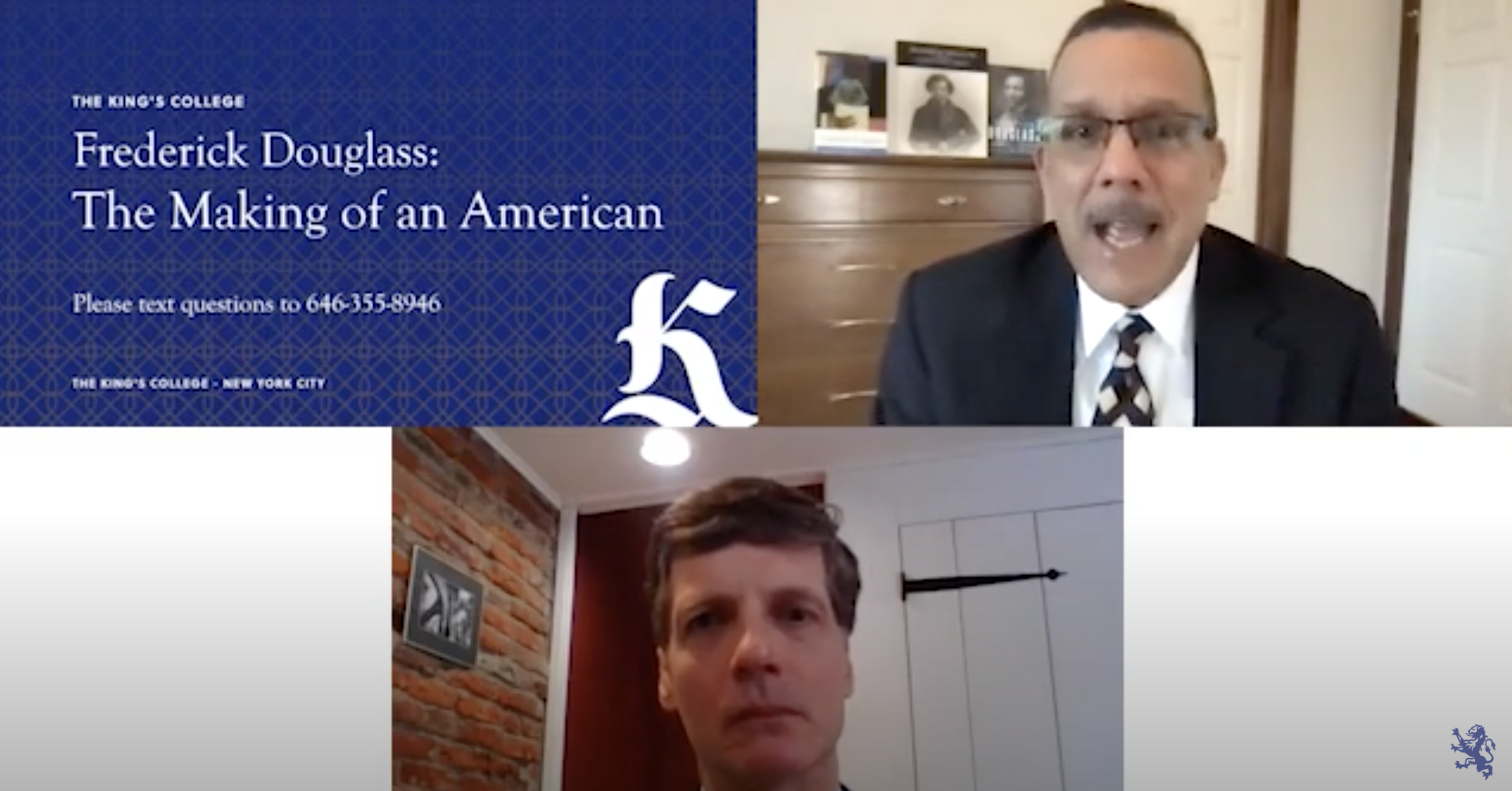Black History Month Address by Dr. Lucas Morel
Dr. Lucas Morel, Head of the Politics Department at Washington and Lee University in Lexington, Virginia, held a virtual lecture on Feb. 11 highlighting the life of famous abolitionist Frederick Douglass.

As a part of The King’s College’s Black History Month Address, Dr. Lucas Morel, Head of the Politics Department at Washington and Lee University in Lexington, Virginia, held a virtual lecture on Feb. 11 highlighting the life of famous abolitionist Frederick Douglass.
The address was titled, “Frederick Douglass: The Making of an American.”
WATCH FULL RECORDING: Dr. Lucas Morel on “Frederick Douglass: The Making of an American.”
Morel’s work led him to earn his Ph.D. in political science from Claremont Graduate University and to teach in the master’s program in American History and Government at Ashland University in Ohio. Admitting that he lost his accent a long time ago, he is a New York native and said that this lecture was a sort of homecoming for him, despite being virtual.
Morel began by discussing how Black History Month came about.
“The idea for a month to set aside to focus on black contributions to America began actually as what was known as ‘Negro History Week.’ Its creator was actually Carter G. Woodson,” Morel said. “He was a Harvard trade historian and son of former slaves. He envisioned what he called ‘Negro History Week’ as a way to address the problem of incomplete American History, which is to say, biased American History.”
The second week of February was chosen to celebrate the birthdays of “two great contributors to Black America”: Abraham Lincoln and Frederick Douglass. Morel has conducted much research on the former, particularly for his most recent book Lincoln and The American Founding, published last year for the Concise Lincoln Library Series of Southern Illinois University Press. Of the latter, Morel said that Douglass aimed to bring about an America that was unified beyond race so that we would emphasize “the negro in history” and not “negro history.”
Dr. Morel himself emphasized that while there is much talk of systemic racism, Douglass suggested a closer look at systemic justice. Elizabeth Cady Stanton, a leading activist in the women’s rights movement, remarked after hearing a speech from Douglass that he was a combination of “wit, satire, and indignation,” and Dr. Morel said in his lecture that Douglass contained a “voracity of spirit [that] was matched with a fierce intelligence.”
Early in Douglass’ career, he believed that he could not love a country that did not love him. However, as he moved forward in his career, Douglass soon changed his view and focused on the absence of the word “slave” in the American Constitution. With this, his goal was to free all American slaves.
“The most notable thing that he said in his entire speech was ‘a government of all should be partial to none.’ In a country that claims to be post-racial, we still do not see the concept of liberty and justice for all played out,” Shá Sanders (RTS ’21). “We see a select group (whites) get to live out the full scope of America while African Americans are in many ways still caught in the chains they put on our ancestors.”
Once Black Americans were freed from slavery, they continued to face struggles of inequality. As Dr. Morel noted, Douglass believed that the denial of education was the worst of slavery’s evils. In order to unite as one nation and enjoy the same liberties no matter the difference of race. Education is vital to being an informed voter. It was Douglass’ view that the Black American’s right to vote was directly tied to them being fully recognized for their citizenship and ultimately for their humanity.
“Overall, I think the speech highlighted the forever tension between the political life versus the pursuit of Justice,” Catherine Blanco (PPE ’22) said. “American institutions are amazing and made to change and get better. But, we have to be okay if that means slow change. Sometimes this is hard when injustices are so great we want and even need to have radical change. Douglass I think is a great illustration of this. A man who was in many ways critical of the political life yet willing to pursue justice through it.”
Douglass became one the greatest Americans to ever live and worked to reduce the gap between what white Americans professed to believe and what they actually practiced. Thus, alleviating white ignorance. In his infamous “What to the Negro is the Fourth of July?” speech, Frederick Douglass responded to the question “what shall be done to the Negro when freed?” with “let us alone.” Dr. Morel explained that this did not mean to leave Black Americans to the mercy of the mob but to allow them the comforts of being protected under the law.
Editor’s Note: Originally posted at Empire State Tribune. Reposted with permission. Other Black History Month events included Starlight Art Night, a student-led celebration of Black culture and music on February 20, hosted by The Table. On Thursday, February 18, King’s hosted an installment of the “Difficult Discussions” series on the topic of systemic racism. Dr. Dru Johnson served as moderator with panelists Dr. David Jackson, Associate Director of African American Affairs for The Philos Project; Esther Jhun, Director of Counseling Services; and Dr. David Tubbs, Associate Professor of Politics, Director of the Center for the Study of Christianity and the Black Experience.




